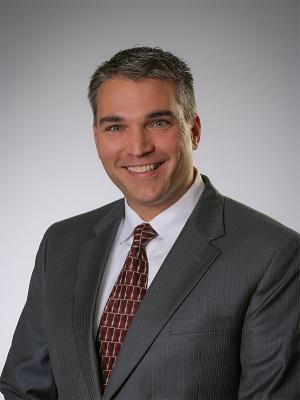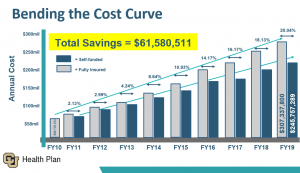Five questions for Tony DeCrosta
For many, health care benefits may seldom come to mind until they are in demand: an illness you can’t shake, family planning or your child’s broken arm.
This is not the case for CU Health Plan Chief Administrator Tony DeCrosta, who joined CU to manage the University of Colorado Health and Welfare Trust in 2014. The trust exists to moderate health care costs for university employees and their families, without reduction of valuable benefits. The CU Health Plan is composed of DeCrosta and his team of CU staff who manage the Trust.
“It’s a fascinating industry,” DeCrosta said. “Health care remains as much, if not more, of a commodity today as it was for humans hundreds of years ago. We’ll always have a need for it.”
True, health care is an evergreen, ever-relevant institution. A regular platform for political campaigns, every politician who has ever run for public office holds a position on health care. The hot-button issue withstands the test of time, and yet, health care is a dynamic, changing service.
DeCrosta is responsible for the overall administration of a $500 million-plus integrated health and wellness plan that encompasses over 85,000 members spanning multiple employers, including the University of Colorado, UCHealth and University of Colorado Medicine. His optimistic and broad business perspective helped lead his team to create and develop innovative products, including the nation’s only employer-sponsored dependent children’s program. In his six years with CU, DeCrosta and the CU Health Plan team have “bent the cost curve,” resulting in health plan savings specific to CU of over $70 million.
2020 marks 10 years of self-funded health plans for the University of Colorado. Self-funded health coverage means the health plan absorbs 100% of the health care claims’ risk, as opposed to insured plans, where the insurance company bears the risk in exchange for profit.
“Most employees aren’t concerned with whether employer health plans are self-funded or fully insured. What matters is the quality care available to them and its cost,” DeCrosta said. “But maintaining self-funded health care demonstrates our employers’ investment in the wellness of this community. A self-funded plan saves both the employee and employer health care costs.”
Before joining CU, DeCrosta was the Chief Human Resource Officer at Colorado State University, overseeing all aspects of human resources including all of CSU’s self-funded health and welfare plans. He spent over 10 years in Fortune 500 companies where he held various senior-level positions overseeing health and welfare plans, pension trusts, operations, labor/employee relations and recruiting, before pivoting to higher education.
First in his family to go to college, DeCrosta served in the U.S. Coast Guard for eight years in order to finance a college degree. He holds a bachelor’s degree in business administration and a master’s of business administration (MBA).
1. The CU Health Plan is celebrating its 10th anniversary in 2020. Can you share more about the team and the importance of this anniversary?
The CU Health Plan is a team of health benefits professionals rallied around a common vision – creating a world where living healthily is seamless and easy. We use that shared vision as motivation to constantly improve the health insurance plans and wellness programs we offer to employees at the organizations we work with.
Our mission to create healthy workforces started in 2010 when the University of Colorado launched the CU Health and Welfare Trust in order to mitigate rising health care costs by self-funding employee health insurance. Since then, we have served hundreds of thousands of employees, and their dependents, at the University of Colorado, UCHealth and CU Medicine. As of December 2019, the CU Health Plan provides benefits for 87,875 members, 40,709 subscribers.
From a personnel standpoint, the trust has grown and evolved, attracting professional, credentialed experts of industry over the last 10 years. At its onset, the CU Health Plan relied on the sheer size of its buying power, but now we have cultivated a skilled team to act as an in-house health benefits consulting and brokerage arm. We are determined to make sure living healthily is easy for our current members and employees at any organization who want better health benefit solutions. We want everyone in Colorado to know what it is like to have health benefits they can afford and still want to use.
I see the significance of this anniversary in the evolution of the university’s reputation as an employer. After 10 years, CU has a reputation in the health care marketplace of not only being a large employer with world-class provider resources and the buying power to compensate its size. CU also represents a sophisticated buying power that invests in valued, quality health care options catered to CU employees and their families.
2. What sets the plans offered by CU apart from other major universities?
We have found that many institutions provide plan benefits through the respective university’s state health care options, which are often managed by Public Employee Benefits Boards (PEBB). Other schools offer a mix benefits plans directly through the university without the assistance of state programs. Oftentimes when universities provide employee health benefits through state programs, the universities won’t work directly with the insurance and wellness program vendors. The CU Health Plan team manages vendor relationships directly, allowing for health care options designed to fit the specific needs of CU employees. Our plans are tailor-made, rather than the ‘one size fits all’ approach to health care that state programs may offer.
3. How has the CU Health Plan helped employees and the CU community at large?
The CU Health Plan creates health insurance plans and wellness programs designed specifically to meet the needs of the people we serve. We’re a self-funded health plan funded by a 501(c)(9) Voluntary Employee Beneficiary Association Trust. We partner with HR department leaders to determine the needs of their employees and collaborate on solutions – from education to creative enhancements of benefits. We save employers money because we do not operate for profit and we essentially remove insurance companies’ profit margins from the equation.
In the world of health benefits, when people think of cost-containment or reduction, it often goes hand-in-hand with the reduction of benefits or increase in cost, such as a higher copay or deductible. It is a very quick way to save a lot of money, but it doesn’t prioritize the needs of the employees eligible for health benefits.
One of the greatest successes of the CU Health Plan over the last 10 years is how we have been able to grow and enhance the benefits we offer, while keeping costs well below normal annual industry increases. Where many employers opt to save money by shrinking employees’ options, we do the opposite.
4. Why is it important for CU employees to understand the benefits available to them?
Approximately 17.7% of our GDP is spent on health care. That is an annual spend of about $3.6 trillion, more than twice the average among developed countries. These numbers will continue to rise over time and are already eclipsing the growth of the greater economy. When U.S. health spending outperforms the growth of our economy, more money is taken out of people’s paychecks to pay for a health care system that is unsustainable long-term.
We have seen an especially dramatic increase in the cost of health care over the last 15 years. From a total rewards perspective, the value of being an employee of the University of Colorado exceeds beyond the monetary value of your salary. We tend to focus on our day-to-day lives and paying the bills, but what is often overlooked is the value of benefits, the largest being health care. If you or a loved one fall ill or need dental or vision services, the health benefit options available to you under the CU Health Plan offer protection for minimal disruption in your daily life.
5. This year has presented unique, unprecedented health care challenges because of the coronavirus pandemic. How is CU Health Plan responding to the challenges of COVID-19?
In times like this, when circumstances regarding the virus are rapidly evolving and health care resources are strained, it is important for CU Health Plan members to put the care of themselves and their families first, without the burden of worrying about cost. The savings earned from consistently maintaining cost-effective health plans for university employees has enabled us to elect to waive cost shares and deductibles for COVID-19 testing.
In addition to waiving cost shares and deductibles, the CU Health Plan team is in frequent and consistent communication with our plan carriers and wellness program vendors to share with our members the most up-to-date information on various telehealth resources available. These updates are distributed through CU’s Employee Services communications as we receive them and they are also posted on our website at BeColorado.org. Additional information on telehealth available to CU Health Plan members is also available to download online.






